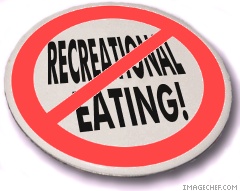What if popular dietary advice was just plain wrong? Mainstream dietary thinking tells us that the number of calories in must balance the number of calories out. They tell us that the best way to make sure that the number of calories in is less than or equal to the number of calories out is to decrease our fat intake. They tell us that we should balance our diet with a certain amount of complex carbohydrates. They tell us that exercise can also alter the equation of calories in versus calories out. So what if all that was just plain wrong? What if the real cause of overweight was metabolic disturbance caused by an imbalance of hormones?
I am currently reading Good Calories, Bad Calories: Fats, Carbs, and the Controversial Science of Diet and Health by Gary Taubes which proposes exactly that theory. I am further inclined to believe that metabolic disturbance theory given my own anecdotal experiences. Firstly, I have been diagnosed with bipolar disorder and have consequently been prescribed various medications to treat that. Fortunately, these medications have been effective in controlling the bipolar disorder, but they have also led to side effects, most notably with some of the medications, weight gain. The worst of these medications for me was Depakote, an anti-seizure medication. I gained crazy amounts of weight on this medication without corresponding dietary alteration, so much so that I told my doctor to change the medication or he would have a noncompliance problem on his hands.
More recently, our dog was diagnosed with epilepsy, and Phenobarbital was prescribed to her. Before her seizure episodes and consequent prescription, we were able to feed her as much food as she wanted without her gaining weight. After she started her medication, she started gaining weight on much less food. At first, we cut back on her food to the level prescribed on the back of the bag. When she continued to gain weight, we consulted her vet and decided upon an amount of food that was even less than is typical for an active dog like her at her weight. We have since been able to control her weight at this lower consumption. Given that she is still an active dog and yet must eat less than her peers, we must assume that her medication causes some sort of metabolic disturbance.
In the book, Good Calories, Bad Calories, Gary Taubes puts forward the theory that overweight is caused by excess insulin. Excess insulin, in turn, is caused by excess carbohydrate in the diet. When carbohydrate is restricted, weight loss occurs even when calories are not restricted. The author cites studies in which carbohydrate restricted diets exceeded 3,000 calories a day and yet weight loss still occurred. Actually, they had difficulty getting their subjects to eat this amount of non-carbohydrate food, not due to boredom as has been postulated, but because the subjects had no appetite for higher consumption. Modern dietary advice tells us that all calories are created equal. Gary Taubes puts forward that this is not the case. Carbohydrates are uniquely fattening because they increase the secretion of insulin. Insulin drives the blood sugar into adipose tissue, often depriving the muscle tissue of that energy. This leads to increased food cravings, which are often satisfied with additional carbohydrates. This leads to a vicious cycle in which carbohydrates are consumed to offset an energy deficit that is redirected to the fat instead.
So let’s go back to my medications, particularly the Depakote. So why did Depakote cause such weight gain even though my dietary intake had not increased, and in fact, I was trying desperately to control my weight? As it turns out, Depakote is associated with hyperinsulinemia, which is an overproduction of insulin. Phenobarbital is likewise associated with changes in glucose metabolism. Given these effects, it is not surprising that both I and the dog would gain weight when prescribed these medications.
Recently, Woman’s World published an article promoting the use of coconut or MCT oil for weight loss. I did a little research to look into this further and found out that MCT oil is most effective for weight loss when associated with a ketogenic diet. This is a diet severely restricted in carbohydrates and high in fat. I did a little bit more research and found out that a ketogenic diet is often prescribed to epileptics. I found this particularly interesting because anti-seizure medications are often prescribed to bipolar patients. I wondered if maybe the ketogenic diet had been found effective in treating bipolar disorder. Particularly, I wanted to know if there was any contra-indication advising against a bipolar patient following a ketogenic diet. I found out that the ketogenic diet had been effective in animal studies of bipolar disorder, but that human studies have not been done. Stanford University wanted to conduct a study of the ketogenic diet for bipolar patients, but was unable to find participants for its study. Given what I have read and given my experience, I am ready to be a guinea pig for such a study.

